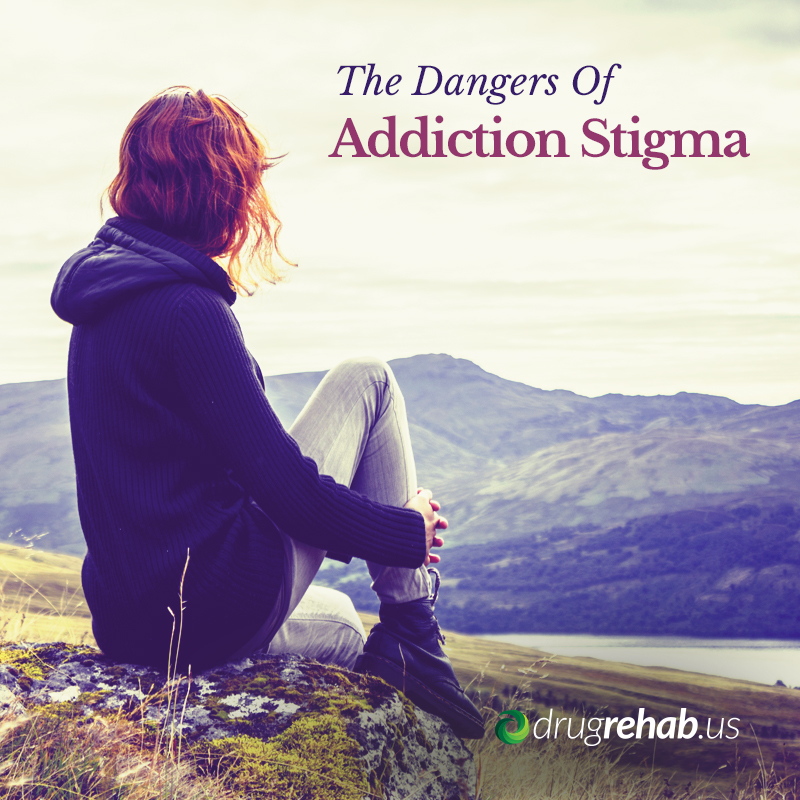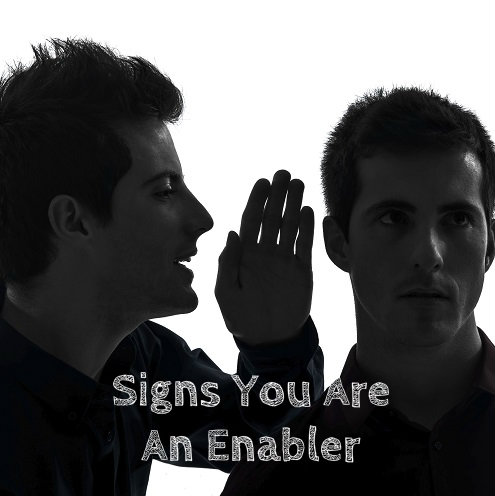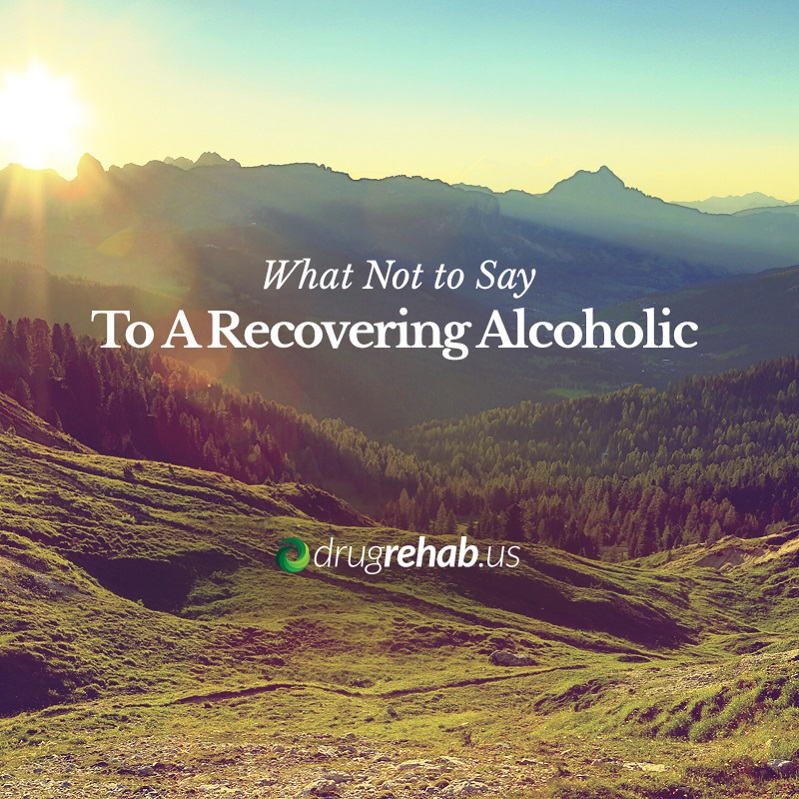06 Nov 2014
What Not To Say To A Recovering Alcoholic
One of the most important factors for a recovering alcoholic in staying sober is the support of friends and family. Developing a strong support network of caring people is crucial to helping a recovering alcoholic. Even when she feels strong in recovery, know that there will be moments of weakness. These are the times when she should be able to lean on you and other supportive friends. With that in mind, understand how important your role is and be sensitive to your friend’s needs. Think before you speak and avoid saying something that will hurt her feelings or her recovery.
Be Careful To Not Say These Things To A Recovering Alcoholic
You’re Not Really An Alcoholic
Nothing could be more insensitive than belittling your friend’s struggles. Whether or not your friend describes herself an alcoholic is not up to you to decide. Even if you were along for the ride, you have no idea what her battle is really like. Only she can know that. Also understand that alcoholics in recovery are still alcoholics. The disease of addiction is one that is lifelong. Your friend will always struggle to resist the urge to drink. Don’t downplay that struggle.
I Feel So Bad For You That You Can Never Drink Again
Pity is the last thing a recovering alcoholic needs. She also doesn’t need to be reminded of the fact that she can’t drink anymore, possibly ever. What she does need is your support in being sober. This doesn’t mean you can’t drink anymore. It does mean that you can play up the other great things you can do in life without drinking. Instead of feeling sorry for her, get her to join you for non-drinking activities. Work out together. Hang out in coffee shops. Become volunteers together for a cause that is important to both of you. Help her embrace a sober life and see how great it can be without alcohol.
You Just Need More Willpower
Nothing is more offensive to a recovering addict than a discussion of willpower. If you don’t understand the disease of addiction, read up on it. Being addicted is about much, much more than simple willpower. Addiction is not a failing in your friend; it is a medical condition. She required treatment and support to stop drinking. Willpower alone cannot help any addict. Thinking that it can is an insult to your friend and her struggles.
Let’s Meet At That Bar We Used To Like
Your friend in recovery may be strong and firm in her sobriety, but you should never assume that she is OK with meeting up in a bar. It is especially insensitive to suggest a bar in which she used to drink. Addicts need to avoid triggers in order to resist the urge to relapse. She may be comfortable being around alcohol, or even other people who are drinking, but let her bring up that fact. Never make that assumption for her. She may go along just to prove her strong sobriety, but it could end up being a mistake. Instead, suggest that you hang out at home, at a café or coffee shop, a park or anywhere else but a bar.
Being a friend to a recovering alcoholic is not always easy. Some days it may feel like walking through a minefield. If you are sensitive to your friend and her needs and you think about what you say before it comes out of your mouth, you can be the good, supportive friend that she really needs.
The ways in which addiction impacts families are numerous. If you have been struggling because someone you love is battling the disease of addiction, you need help. The addict is not the only one affected by addiction and is not the only person who needs support to heal.
You may need to attend therapy on a one-on-one basis. You might consider attending sessions with the addict you love. But you should also consider joining a support group. The mutual support of other people who have been through the same struggle can be a powerful tool to help you heal.
How Addiction Impacts Everyone
When someone is battling addiction, he tends to think only of himself. True, he is going through an epic battle that could take his life, but the addict is not the only one to suffer. Addiction is a disease of the whole family. It causes stress and tension in the home and affects the stability of the family unit as well as the well-being—physical, mental and emotional—of each individual in it. It doesn’t matter if the addict is a child or a parent: everyone suffers.
Coping With An Addict In The Family
 Experts agree that there are certain steps you should take if you have an addict in your family. First you need to educate yourself. Learn about addiction, what it is, what it means for the addict, and what it means for you. Education is power and is needed if you are to cope with this issue. Resist the urge to enable the addict in your life.
Experts agree that there are certain steps you should take if you have an addict in your family. First you need to educate yourself. Learn about addiction, what it is, what it means for the addict, and what it means for you. Education is power and is needed if you are to cope with this issue. Resist the urge to enable the addict in your life.
This seems obvious, but enabling can be subtle and you may not even realize you do it. Financial support, making excuses, taking over responsibilities are all ways in which you enable the disease of addiction. Finally, it is crucial that you help yourself through this process and a big part of that is getting support.
Joining A Support Group
You care about the addict in your life and you want to help him, but you can only do so much and you have to take care of yourself as well. Don’t deny or belittle the negative impact that addiction is having on your life. Acknowledge it and ask for support. Loving an addict can mean emotional, mental and physical distress. You can’t bear this alone, which is why support groups have been meeting for decades to help people like you.
Support groups for families of addicts are available nearly everywhere. If you live somewhere remote or have no transportation, you can at least find an online group to join. The benefits of joining one of these groups are huge. Simply being there to listen to the stories of others has a big psychological impact. Knowing that you are not alone in your struggles and that other people understand you will be a great comfort.
Be sure to attend sessions regularly to get the most benefit. It is also important to participate. If you are uncomfortable sharing at first, take your time. Go to a few sessions and just listen. The other members will understand that you don’t want to share right away. As you get to know how the group works and become familiar with the members, you will start to feel more comfortable. Push yourself to share. Talking about your own struggles will help both you and others. When you open up you begin to heal and when you begin to heal you will be better able to help the addict you love.
You And Your Addicted Loved One Are Worth It – Call Us Now For Recovery Help
04 Nov 2014
The Danger Of Addiction Stigma
Addiction is one of the most stigmatized diseases there is. Stigma refers to a sense of disgrace or shame attached to an action, behavior or situation. Many people still view addiction as a choice or evidence of weak moral character, and therefore as something shameful. Even as research and scientific evidence point to the medical characteristics of addiction and the chemical brain changes that occur in addicts, we still stigmatize addiction. If you or someone you know has battled addiction you know how overwhelming that stigma can be. It can also be dangerous and it needs to be shattered.
Stigma Prevents Addicts From Getting Help
 Perhaps one of the biggest dangers of stigma is that it keeps addicts from getting the professional help they so desperately need. When society at large views addiction as a moral failing rather than a medical illness, it makes sense that addicts would not want to admit to having a problem with substance abuse.
Perhaps one of the biggest dangers of stigma is that it keeps addicts from getting the professional help they so desperately need. When society at large views addiction as a moral failing rather than a medical illness, it makes sense that addicts would not want to admit to having a problem with substance abuse.
Why admit to something that would make everyone around you think less of you? It hurts to think of being treated that way, but it happens. And for this reason, many addicts deny their problem, hide their habit and refuse to get life-saving help, sometimes until it is too late.
Addiction Treatment Lags Behind Modern Medicine
Another danger of the stigma of addiction sits squarely in the world of medicine and the way in which the disease is treated. In spite of new research that shows the truth about addiction and which keeps growing in scope, treatment lags behind. We now know that addiction is a disease of the brain and should be treated as such. And yet, the majority of addicts in treatment are not getting care that is based on evidence and research. Just a small portion of addicts gets treatment that reflects what we know about addiction. Only when stigma shifts will treatment begin to change.
Addicts Are Going To Jail
The stigma of addiction is also entrenched in the justice system. Many addicts end up in jail for minor drug crimes, such as possession, when they really belong in treatment facilities. Most of the crimes committed by addicts are in the pursuit of drugs; in other words, their actions are a part of the disease. Sending an addict to jail for possession is almost akin to jailing someone with cavities for eating sugary foods or an obese person for having junk food. The latter two may sound ridiculous, but if we remove the stigma from addiction and view it as a disease, sending an addict to jail for having heroin would also sound outrageous.
Shattering Stigma
Stigma is dangerous. It prevents addicts from getting treatment, subjects addicts to sub-standard and ineffective treatment, and puts addicts in jail. If the incidence of addiction is to be reduced, we need to reduce stigma. If you or someone you know is an addict, it’s time to speak out and get help. We can work to end stigma by refusing to be quiet or complacent about addiction. Don’t deny the problem. Actively seek help and evidence-based treatment. Talk about your addiction and make sure people listen.
There is nothing shameful about having a disease and it’s time that everyone recognizes that fact. Stigma is killing addicts and that is the real shame when it comes to addiction. Change is coming, as evidenced by work of researchers and advocates for addicts, and it can’t come soon enough.
Time To Get Started And Take Action – Take That First Step To Addiction Recovery – Call Us Now!
30 Oct 2014
Tips For Dating A Recovering Addict
Dating can be tough. You meet all kinds of people in bars and clubs and maybe you meet some real strange characters in online dating as well. What happens when you meet a recovering addict? Is that a deal breaker or should you consider getting to know him better? The choice is a personal one, but before you dive head first into a relationship with a recovering addict you should be ready for what lies ahead. It could be the real deal, or it could end up being a nightmare relationship.
Realization With And Support For Your Recovering Partner
 The first thing you should know about dating an addict is that he is, in fact, an addict. Addiction is a lifelong disease and even if he has been sober for years, a relapse is always possible. Also know that love does not conquer all, especially real world problems like addiction.
The first thing you should know about dating an addict is that he is, in fact, an addict. Addiction is a lifelong disease and even if he has been sober for years, a relapse is always possible. Also know that love does not conquer all, especially real world problems like addiction.
Your recovering addict partner will need your support, and as much as you love him, he will try your patience at times. Sometimes love is not enough to make a relationship work in the face of real problems. If you understand these realities and accept them, you may be ready to start dating a recovering addict.
Tips For Dating An Addict In Recovery
Here are some important tips to keep in mind as you take this journey:
- Look for honesty – The fact that someone has struggled with addiction need not be a red flag or a relationship ender. What is important is his honesty and openness. If he has been up front with you about his past struggles it shows that he has largely overcome them and is not ashamed. He has done good work and is willing to share that with you. This is a good sign.
- Be open – You also need to be open about his past. Talk about how it makes you feel and what your concerns are. He should be willing to discuss it with you and can likely allay some of your fears. Starting out on your relationship with solid, open communication will help you have a stronger partnership when times get rocky.
- Find the limits – Some recovering addicts cannot be around drugs or alcohol at all. Make sure you know whether you need to refrain from drinking in front of him and be prepared to make those accommodations if necessary.
- Learn the signs of substance abuse – Relapse is always possible, no matter how put together he seems now. Make sure you know the signs of a slip up so that you can be prepared if he relapses and starts using again. It may be obvious, but he may also be subtle about it. Try not to be over-vigilant, but do be aware of changes and what they might mean.
- Volunteer for therapy – If your partner is still attending therapy sessions or occasional counseling, be ready to join in. Offer to go along if he needs or wants you to. It may be a personal experience for him, but he might also want you to be involved. Be open to the experience.
- Take care of yourself – There will be times when dating a recovering addict is stressful for you. Being caring is important, but don’t forget to take care of yourself. Take time off to be alone and to do things that keep you happy and sane whenever you need it.
Make Sure He Meets Your Needs Too And Understand The Challenges
Dating a recovering addict is not impossible, but it may represent an additional relationship challenge. The important thing is that you find someone who meets your needs. If that person happens to be an addict in recovery, understand the unique challenges and be ready to meet them.
Learn More About Addicts And Their Excuses
24 Oct 2014
How A Pet Could Help The Addict In Your Life
If you have ever had a pet—a dog, cat, lizard or even just a goldfish, you know that they can help you feel calm, joyful, loved and needed. Caring for an animal and loving and being loved by one is powerful. Using animals in therapy sessions, or even just to calm patients’ nerves in a dentist’s office, has long been a tool in the arsenal of health care providers. With this in mind, consider getting a pet to help the recovering addict in your household. The responsibility of caring for an animal and the unconditional love it will provide could be greatly beneficial.
 Animal-Assisted Therapy
Animal-Assisted Therapy
To understand why having a pet could help the recovering addict you care about, it’s important to learn a little bit about how therapists have used animals to help patients. Patients with a range of illnesses and conditions can benefit from having an animal involved in therapy. This includes children who have suffered from abuse, people with mental health conditions, patients undergoing painful and stressful medical procedures, people facing the stress and fear of terminal illness and even addicts.
Research has uncovered what humans have long known: being around animals is good for us. Even for healthy people, animals make us feel happier and more relaxed. We even know from research that simply petting a dog can lower blood pressure dramatically. Being around and touching animals has also been shown to raise levels of a hormone called oxytocin, which makes us feel happier and more loving.
Bringing A Pet Home For A Recovering Addict
With the benefits of being around animals in mind, consider bringing a pet into your household if you are caring for a recovering addict. A dog or cat, or even a bird or fish, has the potential to bring joy, purpose and meaning back into the life of your loved one. You can choose the level of care and responsibility needed by selecting the right pet. A dog is a great choice if your loved one is active and capable of taking care of a dog’s many needs. If your loved one doesn’t seem ready for a dog, a cat or other pet could be a good choice.
If you decide bring a pet home, get your recovering addict involved every step of the way. Let her help in the decision-making and learn with her how to care for the new pet. Being a part of the process will give her a sense of responsibility, a new purpose and a greater sense of self-worth. The love that she gets in return will be a powerful motivator to stay clean and sober.
Pets Are A Responsibility
As you make the choice about getting a pet to help your loved one, keep in mind that pets are a responsibility. A pet needs a person to care for him and will depend on that person. If you are unsure whether your recovering addict is up for the task, be prepared to step in and care for the animal and all his needs. If you are not prepared to do this, you may not be ready to welcome home a pet.
Rescue Pets – Tools For Healing And Recovery
Animals are powerful tools for healing. To help the recovering addict in your household, consider rescuing a pet. Check out your local animal shelter to find a cat, dog or other animal that needs someone as much as your loved one needs to care for a pet. You may both be surprised at how much healing power comes in a small, furry package.
23 Oct 2014
When To Cut An Addict Out Of Your Life
Knowing when to walk away from an addict in your life is difficult, but there is an appropriate time to say enough is enough. The exact timing depends on you and the addict in your life. It is a personal choice to let go of this friendship or to cut this family member out and this is one decision that only you can make.
When you have exhausted your ability to help your loved one and he still won’t make any changes or even admit to having a problem, it’s time to at least consider walking away. You can’t make anyone change. Only he can make that ultimate choice.
Reasons To Cut Addict Out Of Your Life
As you contemplate your next move, here are some important reasons to cut an addict out of your life:
- You have devoted a huge amount of time and energy trying to help your loved one, to no avail. – You’ve learned about addiction to try
 to understand what your loved one is going through. You staged an intervention and brought in a number of friends and family members to try to reach him. You spent countless hours trying to convince your friend that he has a problem and needs help. You set limits and boundaries and he continues to cross them. When your efforts are monumental and met with nothing but resistance, it may be time to move on.
to understand what your loved one is going through. You staged an intervention and brought in a number of friends and family members to try to reach him. You spent countless hours trying to convince your friend that he has a problem and needs help. You set limits and boundaries and he continues to cross them. When your efforts are monumental and met with nothing but resistance, it may be time to move on.
- Your friend has taken advantage of your charity. – It’s important for addicts to have friends and family members to support them, but when the addict still refuses to change and starts to take advantage, you have a problem on your hands. Not only is your loved one hurting you, but you have also become an enabler. Maybe he is taking your financial support, which you thought was helping him keep his apartment, and is spending it on drugs. Maybe he has stolen from you. Decide how much of this you can take and then change your locks and cut him off.
- Your loved one has become violent or frightens you. – The moment you feel your safety has been threatened, either by your loved one or his friends or acquaintances, tell him it’s over for now. Your safety should never be compromised by someone you love, no matter the situation. Take a zero-tolerance stance when it comes to violence or threats.
- Your health—emotional, physical or mental—is suffering. – Loving someone who is addicted can take a huge toll on your health. If your loved one’s situation is causing you increased levels of stress, to the point that it is causing physical symptoms, sleep loss, or other major issues, you have to consider making a change for your own well-being. You can’t help someone when you aren’t well yourself. Take time off to get better and then consider trying to help again.
Make The Decision But Offer Support If Your Loved One Gets Addiction Treatment Help
Cutting someone out of your life is a tough choice to make, but is sometimes inevitable. It’s important to try to help those you love, but you have to set limits and you have to consider yourself and your own well-being. Also know that this doesn’t have to be permanent. Tell your loved one that you are saying goodbye for now, but that if he can get his act together you will be back to fully support him in his sobriety. This should be a decision you make for yourself, but it may also turn out to be the motivation he ultimately needs to make that change.
Learn More About The Intervention Process And Steps
22 Oct 2014
Alcoholics And Their Excuses
Alcoholism is a disease. It is chronic and it requires lifelong treatment to stay sober. While going through rehab and staying sober are challenging, the first and biggest step for an alcoholic is to get past the excuses and admit to having a problem with drinking.
 Heavy drinkers deny having a problem for a variety of reasons. They fear what happens in detox. They worry about what people will say. Most of all they fear what life will be like sober.
Heavy drinkers deny having a problem for a variety of reasons. They fear what happens in detox. They worry about what people will say. Most of all they fear what life will be like sober.
In spite of the fears, it is important for alcoholics to get help. The consequences of not doing so may be serious.
Pregnant alcoholics risk fetal alcohol syndrome. All alcoholics face health consequences like liver or heart disease. Accidents are common among alcoholics. They also must face the possibility of losing relationships.
Excuses Of An Alcoholic
If you have a loved one who drinks too much, confront him or her. Be prepared to hear this list of excuses alcoholics give to explain drinking:
- I need to drink to feel comfortable in social situations – Many people face social anxiety. It is a real disorder, in fact. It is not uncommon to self-medicate with drugs or alcohol, but it is not a good excuse. Self-medicating is dangerous. Therapy can help anyone overcome social anxiety.
- I’m only hurting myself – Addicts are great at claiming that their habit is their own business. Remind your loved one that drinking affects everyone else too. When drinking makes the alcoholic remote, angry or temperamental, everyone suffers. When drinking costs the family money, everyone suffers.
- I need alcohol to cope with work stress – This is a common excuse. Stress relief is an important part of being healthy and a drink or two on tough days does not make one an alcoholic. Many jobs are stressful and drinking feels good. This may be why there is so much alcoholism in the healthcare field and other high-stress careers. It isn’t an excuse for heavy drinking, though. There are many other ways to cope with stress.
- This is just who I am – This excuse is an outright lie. Alcoholics weren’t born drinking. They change to become an alcoholic and they can change again to get sober.
- I’m not as bad as other people – Comparing a drinking problem to a worse problem in someone else is a very weak excuse for drinking. Being an alcoholic exists outside of everyone else. When considering a personal problem, like drinking, it makes no difference what everyone else is doing.
Professional And Caring Help Is Needed
The list of excuses that alcoholics make could go on and on forever. They will come up with anything under the sun to justify continuing to drink and to avoid getting help. When the excuses finally run out, you can hopefully convince your loved one to get much-needed help. Only professional therapy and counseling, along with your support, will be enough to overcome all the excuses.
See How To Recognize The Signs Of Addiction Denial In A Loved One
If Your Loved One Needs Help With A Drinking Problem, Reach Out To Us Today – We Will Help You And Your Loved One Take That First Step!
13 Oct 2014
Are You An Enabler?
Behind many addicts you’ll find enablers. An enabler can be a parent, a spouse or even a child, and usually her intentions are good. The problem is that loving an addict, supporting him and empowering him can often turn into enabling. When you enable the addict in your life you are only making the problem worse and preventing him from getting the help he really needs. So how do you know if you are helping or hurting?
What Is Enabling?
Enabling means taking away or covering up the consequences of your loved one’s addiction. Consequences are powerful motivators. When an addict destroys his relationships, loses his job or spends all his money on drugs he is forced to face the truth about his problem with drugs or alcohol. If you take actions to shield him from these consequences, he need not face the truth and he will likely keep doing what he is doing. You are enabling him.
Put this way it sounds pretty straightforward. When you’re in the thick of it, though, it can be tough to know if you are enabling your addict or helping him. You should help your loved one. You should empower him to get help for himself. Helping an addict doesn’t always mean tough love, but there can be a fine line between caring and enabling.
Signs You Are An Enabler
 Here are some surefire signs that you are an enabler:
Here are some surefire signs that you are an enabler:
- You make excuses or lie – You cover up or gloss over bad things that your loved one is doing and make excuses to other people. For instance, you might explain away his embarrassing bender at a party by telling everyone that he was sick and the alcohol interacted badly with his cold medicine.
- You take on his responsibilities – For an addict, everyday responsibilities are usually the first thing to go south. If you pick up the slack by picking up the kids from school, doing his chores, taking care of his aging mother or anything else he is supposed to do, you are not letting him feel the consequences of his neglect.
- You put the blame for his problems on anyone but him – Addicts are great at assigning blame to third parties. It’s part of denial. You may add to the problem by encouraging this or telling him that he’s right. You may even blame yourself. The truth is that he makes his own decisions and he needs to realize that.
- You take care of him financially – Addiction costs money. Do you give him more money when he runs out? Do you pay the bills or legal fees? Helping him financially may seem unconnected to his addiction, but it isn’t.
- You avoid addressing the problem out of fear – If you are afraid to face the problem of your loved one’s addiction because you are afraid of a fight or that he will leave you, you are enabling.
How To Stop Enabling And Start Helping
If you recognize the enabler in your habits, it’s time to stop. Start with a conversation about the problem. Stop ignoring it. Tell your loved ones that things will change from now on. You will no longer take care of his responsibilities. You will no longer give him money. What you will do is support and love him. Offer to be there as he gets help or goes to rehab. Tell him and show him that you are there to help and support, but that he needs to get help. Once he starts to really feel the consequences of his addiction he will start to realize the extent of his problem.
Find Out If Are You The ‘Chief Enabler’ For An Addict – And What To Do About It



